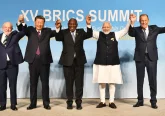 Tony Blair
Tony Blair
A Journey: My Political Life
Knopf, 2010
720 Pages
£35.00
ISBN 978-0307269836
“This shows what it’s like being Prime Minister. That’s exactly what the readers want to know. How does it feel to run a country? How does it feel to be so cut off? How does it feel to be so hated?” – ”The Ghost”
This is the obvious checklist for a political memoir, a genre which still manages to be notoriously boring. Tony Blair’s A Journey, though, purposefully evokes a sense of unceasing contingency about the life of the 51st British prime minister. His thematically organized memoir is a folksy, well-paced, and at times cinematic rendering of a decade in office begun in exhilaration and finished in a hearty good riddance shared both by the leader and his country. It’s all there in 720 pages, the self-aware ambition, biting but eminently fair tweaks at Gordon Brown, and an unapologetic defense of muscular humanitarianism in Iraq. And at the end, a solemn, almost despairing, coda on Blair’s grappling with the democratic dilemma: Do you do what the people want? Or what you believe is right?
When a tense Blair entered 10 Downing Street in 1997, his Labour Party promised nothing less than the social renewal of Britain. This was not a new goal, but as Blair makes clear, Labour thinking before him had grown stale. His vision of “stakeholding” in New Britain (1996) and Anthony Crosland’s priority on the poor in The Future of Socialism (1963), what Blair calls “a magnificent essay”, were different visions by Labour leaders of how to redress capitalist excess. For Crosland, writing in the midst of postwar prosperity, the seemingly reachable goal was a classless society. Blair, however, makes a point of not begrudging the well-off. Instead, his mantra centered on renewing social commitment in an era of welfare state dependency, stagnant public services, and the stain of long-term unemployment. His efforts at “modernization” in hospitals, schools, and the police force were also a way to power for a party whose traditional roots of support—unions and manufacturing—have been in secular decline.
The memoir tellingly begins with politics, not a misty-eyed recall to ancestral homes in Glasgow and County Donegal; though, Blair weaves anecdotes as asides in his narrative. The man whom Blair calls his “soulmate”, Bill Clinton, relates in My Life (2004) how he learned to take a hit at an early age, when a ram butted him over and over, nearly gutting him. Blair’s own lesson in toughness came from compulsory boxing in school, a handy preparation for the travails of Prime Minister’s Questions: “Either do it properly or refuse to do it at all—that’s also fine—but don’t do it like a wuss.” He is wittily frank throughout, noting Alastair Campbell’s “great clanking balls”, comparing indignant pensioners to an angry “Rottweiler on speed”, and expressing relief at doing “the proper modern dad thing”, which is, apparently, paternity leave. Though he is pithy at times, he is more often than not likely to pursue a thought as if in conversation with the reader, at his best when describing those closest to him—as in doting on his baby son Leo, “a pocket-size piece of benign innocence.”
The import of style lies in its service to that incorrigible force in politics: ambition. How Blair came to his political convictions was not through the sort of examination favoured by the “intellectual types” he disdains, but through an enthralling first encounter with parliamentary stateliness. He wasn’t particularly active in campus politics at Oxford, and didn’t join the Oxford Union. (Though, he does fondly recall discussing social issues with his friends at St John’s.) Instead, it was in the Central Lobby of the Houses of Parliament where Blair was thunderstruck: “Here I was going to be.” Nowhere else in A Journey is the fine line between ambition and selfishness so apparent. What are surely deeply felt motivations behind NHS reform, anti-social behavior legislation, and justifications for the wars would come later, but at least Blair is honest. He loves, craves power. And so it is no surprise that he is at his wiliest in wiggling around Gordon Brown to assume leadership of New Labour, depicting Brown as intellectually brilliant and skillful, but also an overcautious and unfailingly strange rival wedded to traditional, Crosland-inspired Labour. Blair says Brown is a loser, and who wants a loser as leader? Blair is admirably unfeeling about his own ambition, writing that it was better to have Brown on the inside and a bit obstructive than on the outside and destructive. Only Michael Corleone could have said it better.
But was it all ambition? The day his memoir was released, Blair was roundly paddled in the British press for refusing to apologize for the British role in the Iraq War. Readers ought to be interested not in whether he apologizes for or regrets the war—he doesn’t—but in how he justifies it and whether those justifications are still relevant.
Indeed, Blair is thoroughly defensive over the course of 108 pages, proffering myriad arguments for his decision to join the United States in the invasion, liberation, and occupation of Iraq. Resorting to checklists of Iraqi non-compliance with UN resolutions, he attempts arguments that are consciously offered as just that—arguments for consumption, not true justification. He propounds more forcefully on the universality of freedom and the obligation of democracies to spread it, an intense extension of his faith in humanitarian interventionism.
Despite his reasonable blame of external actors for Iraq’s instability, there is no hint that he envisioned whether or how the United States and United Kingdom would have to respond to Iranian influence and al-Qaeda’s attacks after the invasion. His equivalence—critics would argue conflation—of “agents of al-Qaeda and Iran” with the “same menace” in parts of Pakistan, Palestine, the broader Middle East, Somalia, and the Far East to “our own streets, on our airways, in the meeting places of our own nations” creates a spectre of Islamist extremism that, as Blair believes, is the 21st-century parallel to the communist threat of the 20th century. He asserts that the West defeated revolutionary communism by standing up militarily and providing “a comprehensive strategy for changing the world and in doing so exhibit[ing] the values that, at our best, we believe in and act upon.”
Fair and laudable. But the resemblance between the clarion calls to defeat communism and to vanquish Islamist extremism ends there. The American response to revolutionary communism was premised on the belief that containment would lead to stability and eventual Soviet collapse, not on the idea of forcible and immediate regime change to democracy. The American strategic response, the Bush Doctrine endorsed by Blair, was the branding of Iraq, Iran, and North Korea as the “axis of evil”, opening the door to pre-emptive war. Eight years later, Blair offers little more than he endorsed then, a strategy to which Western governments and publics are frankly unwilling to resort again anytime soon. His flat statement that a nuclear Iran matters more to its Arab neighbors than to America only further confuses the final analysis. Though he tries mightily to explain, it is unclear on which justifications for pre-emptive force Blair places priority. A brutal state? Nuclear capability? Both?
Whatever the answers, Blair believes he was and is right, his popularity be damned. But throughout the memoir, he wonders whether he acts out of fear or courage. This emotional battle reflects the democratic dilemma of serving as a delegate versus as a trustee. Delegates faithfully try to execute the people’s mandate and opinion as far as they can be discerned, and like all politicians, Blair became a delegate around election time. His admiration for Margaret Thatcher, dislike for unions, and engagement with Europe were all probably genuine—though they also conveniently mapped onto what the center of the British electorate believes. His finest moments, though, were as a trustee. When expressly serving the interests of the British people, Blair often excelled, whether gracefully handling the death and funeral of Princess Diana, impressively helping to forge peace in Northern Ireland, or deftly bringing the 2012 Olympics to London—stories he tells us with charm, humor, and humility. Those events made Blair popular for a time. But trustees hardly are forever.
At the dawn of war on 18 March 2003, Blair urged the House of Commons and his nation, “But the point is that history doesn’t declare the future to us so plainly. Each time is different and the present must be judged without the benefit of hindsight.” In other words, trust me. As A Journey stumbles to the end with increasingly assertive broadsides about foreign policy, it reads as if Blair is channeling Edmund Burke from 1774: “Your representative owes you, not his industry only, but his judgment; and he betrays, instead of serving you, if he sacrifices it to your opinion.” In the last pages, Blair grasps for an understanding of his political life, its evolution from fearful popularity to courageous ignominy. His conclusion will be unsatisfying to some, but for what he grapples with—war, ambition, governance—to be only satisfying would be the greatest disservice of all.
Rahul Prabhakar is reading for an MPhil in International Relations at St Johns College, Oxford.
This article was first published in the Oxonian Review, Issue 15.1, on 17 January 2011. Politics in Spires is grateful for the editor’s permission to reproduce it here.







No Comment